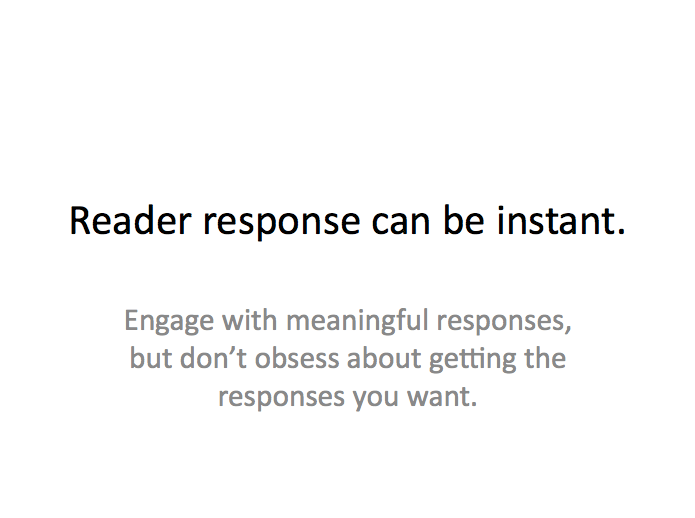
Six Things We’ve Learned About Creative Writing Online
We were invited to attend the Minnesota Colleges & Universities English and Writing Conference on March 30 at the Minneapolis College of Art and Design, to share with the audience of English/writing teachers and scholars what we’ve learned about creative writing online. Our audience was, uh, small (see above), so here’s an online version of our presentation in case anyone else gives a crap.
There’s plenty of great writing online that people decide to label “creative writing” or whatever, but everyone online is writing all the time—and a lot of the best online writers are people who don’t go around calling themselves “writers.” Writing is important to us and to a lot of the people who read and submit to The Tangential, but most don’t attend writing conferences. (Apparently.) So if you’re looking for good writers, and interested readers, online, keeping an open mind is key.
In offline literature, you published your writing in a book or a journal. In next-gen literature, you put your writing in a blog post. Now, smart writers (and readers) recognize that writing is everywhere online: tweets, Facebook statuses, Gchat, macros, and so on. The idea that writing is a process, not a product, is nothing new—but that’s especially true online. If you think of social media as purely a way to promote yourself as a writer, you’re missing out. Twitter is writing. (See: “Why ‘Internet Poetry’ is No Joke.”)
Catchy titles and compelling openings are valuable offline too (just ask any IRL publisher), but they’re essential online. Post titles have to both grab readers’ attention and clearly communicate what the tone and content of the post will be—readers will be seeing those titles mixed in with God knows what else in their Twitter streams and RSS readers, so 1Q84 probably isn’t going to work for a piece of writing posted online. The structure, presentation, and length of your post matter too, as do visuals: if book jacket design is important, website design is even more important. Photos matter. It’s not that every piece of creative writing online has to be something like “Pros and Cons of Winnie-the-Pooh Characters We’d Like to Fuck,” but if you want to find an online audience for your writing, it’s a good idea to at least take into consideration why writing like that works so well online.
Readers expect to pay for offline writing—or to borrow it from a library that paid for it. Readers don’t expect to pay for online writing. It’s not that they never will, but unless you’re the New York Times, good luck with that. We’ve written a lot about this (see: “Would Marx Blog?”, “Why I’m Writing This For Free,” “Why Publications Need to Be as Lightweight as Possible”) because we don’t think the decline of the traditional publishing model (you write, I edit/publish, they pay us) is necessarily a bad thing. The Internet is a really exciting place to be a writer right now: you can reach a wide audience without the help of Simon & Schuster. What you do with that audience is up to you.
Relationship-building has always been part of reading and writing: you often pick up a book because you’ve liked previous work by that author. But Jonathan Franzen, with his big publishing contract, can afford to think Twitter is the devil and publish his writing only occasionally—the rest of us can’t. The writers who do best online are those who post regularly and become part of readers’ daily routines. The Tangential has always been a collaborative project, which has helped both to motivate us (in the beginning, each of us knew there were at least two other people who would read our posts, even if nobody else did) and to keep the blog popping with new material every day.
Instant reader response is the agony and the ecstasy of online writing. You want it—of course you want it—but you have to come to terms with the fact that you can’t control it. If someone makes a comment or posts a response that’s thoughtful or meaningful, great. Show those people some love, however you want to do that. At the same time, as you develop a larger audience, you’ll have to develop a thick skin and recognize that almost any response is a kind of win. Even if someone posts something hating on you, it means they’re reading you and taking you seriously. And isn’t that exactly what you wanted?
– Written by Jay Gabler with input from Becky Lang, Katie Sisneros, and Dunstan McGill
Photo by Dunstan McGill







